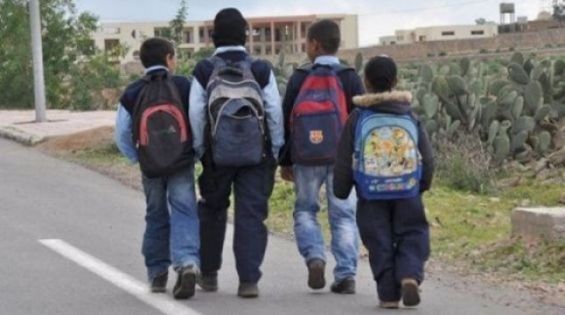To prevent the spread of the novel coronavirus, Morocco’s National Education Ministry launched, March 16, a distance-learning program to catch up with classes after the government decided to shut schools and universities across the country.
While some people welcomed the program, others pointed at its shortcomings, especially those related to students located in impoverished rural areas. In a statement sent to Yabiladi, Mohamed Badnanoun, head of the Solidarity Association for Social Development and against School Dropout, regretted the fact that this program is not fit for «all students».
«The nearest school is about 6 km away from us», said Badnanoun who is based near Deroua, a town located near Casablanca.
Distance learning and rural students
Faced with this situation, the association has decided to create a Facebook page, in which it publishes courses for pupils who are supposed to take exams at the end of the academic year. The page also features the programs and national TV channels that air daily classes for students.
Mohamed Badnanoun also said that the NGO plans to provide support and strengthen crash courses for students after the end of the lockdown. «About 36 volunteer teachers have informed us of their desire to provide assistance», he added.
However, it is rather the access of certain families to the Internet that worries the NGO. Thus, the association plans to donate Internet top-ups to families in need to allow their children to attend classes. Despite this move, some students and their parents do not know how to use the internet, which could be very slow in some remote villages and towns across the Kingdom.
The same worries were voiced by Mustapha Al Hanchaoui, president of the Association of primary education teachers in Assa-Zag. «A number of families are finding it difficult to afford Internet top-ups so that their children can study online», he said.
The activist explained that some students are struggling with other problems, especially when it comes to the «multiple textbooks» used in different parts of the Kingdom for the same class. «Students realize that they have to take these classes using textbooks that they have never seen before and that they don’t even have in the first place», he explained.
Moreover, Mustapha Al Hanchaoui explained that it is hard for teachers to really know «whether or not their students follow their lessons on the channels provided for this purpose».
In order to «overcome this obstacle», he specifies that communication through instant messaging applications like WhatsApp is useful. «However, not every student out there is blessed with good internet and a smartphone», he regretted.
And although the Assa-Zag provincial council distributed tablets to village students, «there are also problems with access to internet, and even when it is accessible the speed remains very low».
A method of teaching that cannot replace classes
Meanwhile, a primary school teacher in the province of Sefrou said that 50% of his students live in boarding school, because they come from isolated douars (villages)».
According to him, after they left school on Friday March 13, he lost track of them and cannot contact them anymore. «We were unable to communicate with them to start distance learning. The majority of our students do not have smartphones, computers or tablets», he said.
This teacher also pointed to a «certain confusion» for the programs broadcast on TelmidTICE or on television channels. He mentions, for example, courses that were «already explained to students» or even «early presentations of subjects, which have not yet been explained to them». He also referred to the multiple textbooks matter mentioned before.
«Students from rural areas are unfamiliar with technology and internet», he added. «Of the 60 students I teach, I could only communicate with 10 of them», he regretted.
«Distance learning and teaching cannot replace direct assistance teaching, because the teacher, like his students, actively participates to the process», the teacher concluded.
Alternative solutions for rural students
For her part, Wafae Chakir, director of the regional delegation of the Ministry of National Education in Sefrou estimates that «a limited number of families do not have a television». She also recalled that the TelmidTICE platform can be accessed without internet, adding that several teachers have created «online groups to communicate with their students».
«In Sefrou, almost 80% of the pupils benefit from distance education, and the remaining 20% are pupils of the first years of primary education. To do this, we initiated a proactive process and the day after the suspension of the courses, we gave them files containing lessons to work on».
The official admits that these are «necessary alternatives» and notes that the textbook «is only a means that shares the basic skills to be taught to the student», she concluded.





 chargement...
chargement...













